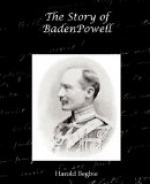A good description of Baden-Powell is that versatile officer’s own sketch of a man with whom he soldiered on one of his campaigns: “He has all the qualifications that go to make an officer above the ruck of them. Endowed with all the dash, pluck, and attractive force that make a born leader of men, he is also steeped in common sense, is careful in arrangement of details, and possesses a temperament that can sing ‘Wait till the clouds roll by’ in crises where other men are tearing their hair.” The public in the light of recent events will be quick to recognise B.-P. in the latter part of this portrait; I can assure them that the rest is equally accurate. As a regimental officer he exhibits all these good qualities. He can show the men dash and pluck in every sport they care for, his common sense makes him the friend of Tommy Atkins as well as his officer, and the affairs of his regiment are so admirably managed that there is no enervating air of slackness about the barracks from the first monitory note of “Reveille” to the last wailing sound of “Lights Out.”
And while Baden-Powell is loved in the barrack-room he is ever the most popular figure in the Officers’ Mess. There is nothing of the namby-pamby, I mean, in his solicitude for the soldier’s welfare, nothing to make him unpopular with his brother officers, nothing that makes even the youngest subaltern a little contemptuous. Tout au contraire. The place he holds in the affections of his brother officers may, perhaps, be seen in a quotation from the letter of an officer in the 13th Hussars, which I received during the most anxious days of the siege of Mafeking. After saying that relief ought to have been sent before, my Hussar says, “Poor dear chap, he must be severely tried. As I eat my dinner at night I always wish I could hand it over to him.” Could a Briton do more?
Such then is Baden-Powell’s character as a regimental officer. Beloved by the little fashionable world of the Officers’ Mess, adored by the men who eat and sleep and clean sword, carbine, and boots in the one room, he presents to the gaze of the schoolboy whose whole thoughts are set upon Sandhurst the beau-ideal of a regimental officer.
To reach that ideal there are five great essentials—keenness, courage, high-mindedness, self-abnegation, humour. Ability to mix freely with private soldiers without loss of dignity is, I take it, the natural gift of a gentleman; and if the officer who devotes himself to his men is high-minded and courageous, always ready to ignore self, with the saving virtue of humour, he will earn not only their respect and admiration, but their loyal and unswerving love.
CHAPTER XIII
GOAL-KEEPER
Baden-Powell was at Henley, preparing to enjoy the festivities of the 1899 Regatta in one of the pleasantest houses on the river, when a telegram arrived calling him to the War Office. This was on Wednesday, and the business the state of things in the Transvaal. On Saturday he was on the sea, sailing away from the coast of England.




